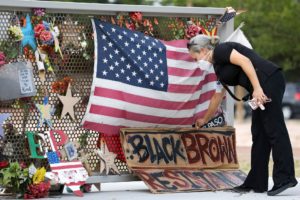
Pastor Michael Grady was in a store on a Saturday morning two years ago when he received a call from his wife. She had learned that their daughter was lying in a pool of blood in a Walmart in El Paso, Texas, after being shot three times.
When he arrived to see his daughter Michelle Grady, 33, they had to lift her body outside using a shopping cart, fighting other wounds victims to get her inside an ambulance. On August 3, 2019, a Texas man drove 700 miles to El Paso from Dallas suburb and opened fire with an automatic rifle, killing 23 people, and injuring about two dozen more.
The suspect told authorities that he targeted Latinos, had railed against immigrants and Latinos in writing. The attack is the deadliest against Latinos in modern U.S. history.
Grady, who advocates for gun control legislation and immigration reform, stood alongside members of the nonprofit Border Network for Human Rights (BNHR) survivors of the massacre and elected officials at one of the events Tuesday to remember those who lost their lives. They are issuing a call to action to “take a stand against white supremacy, racism and xenophobia.”
In a meeting with Latino leaders at the White House, President Biden marked the day memorializing the victims and those wounded and called for addressing the mental health needs for victims and their families. “The most lethal terrorist threat to our homeland in recent years is domestic terrorism — domestic terrorism rooted in white supremacy. We’re going to have to stand united against this violence because it just spills over to all communities,” said Biden.
BNHR held a memorial event on yesterday at the Ponder Park in front of the Walmart, where flowers had previously been placed to honor the victims. It included victims’ testimonials, such as one from a woman who was on her first day of work and an activist who helped those who were injured.
The memorial was a welcome change from last year, when the COVID-19 pandemic, before vaccines, restricted the way families and people could get together. In-person and virtual events had been planned to grieve the massacre’s first anniversary; however, the victims were unable to hug and gather as communities have done in the past after mass shootings because of the social distancing restrictions.
Grady said that the memorial is an opportunity to both pay tribute to the lives lost and address the systemic issues behind the massacre, reminding people about the importance of fighting for human right, instead of “de-escalating” the tragedy.

Recent Comments